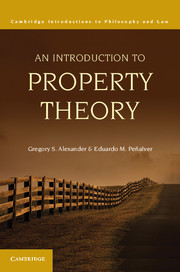3 - Hegelian Property Theory
Published online by Cambridge University Press: 05 June 2012
Summary
Probably less familiar and perhaps less intuitive than theories based on liberty and utility, or welfare, is a third strand of property thought. This line of thinking about property steers away from the social contract-based individual rights of libertarianism as well as an emphasis on aggregate social utility or welfare which seemingly sacrifices concern for the individual. Instead, it focuses our attention on the ways in which property contributes to development of the self, or personality.
This chapter will examine the personality theory in both its classical and modern iterations. We begin with a brief and necessarily truncated account of Georg W. F. Hegel’s theory, commonly considered the source of property theories that stress property’s role in self-realization. We then turn to a modern variation of the personality theory, Margaret Jane Radin’s “personhood” theory. Radin’s theory owes certain elements to Hegel, but her theory differs from the classical personality in several important respects. Finally, we will evaluate both versions of the personality theory, identifying some problems and discussing ways in which Hegel’s and Radin’s theories make valuable contributions to understanding property as a concept and as an institution.
- Type
- Chapter
- Information
- An Introduction to Property Theory , pp. 57 - 69Publisher: Cambridge University PressPrint publication year: 2012



